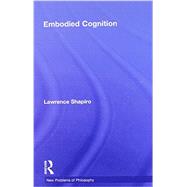
| List of illustrations | p. xi |
| Acknowledgments | p. xiii |
| Introduction: Toward an Understanding of Embodied Cognition | p. 1 |
| Standard Cognitive Science | p. 7 |
| Introduction | p. 7 |
| Newell and Simon's General Problem Solver | p. 7 |
| Descriptive Frameworks | p. 9 |
| Back to General Problem Solver | p. 12 |
| Sternberg's Analysis of Memory Scanning | p. 14 |
| The Computational Vision Program | p. 20 |
| The Solipsistic View | p. 26 |
| Summary | p. 27 |
| Suggested Reading | p. 27 |
| Challenging Standard Cognitive Science | p. 28 |
| Introduction | p. 28 |
| Gibson's Ecological Theory of Perception | p. 29 |
| Structure in Light | p. 30 |
| The Brain's Role in Vision | p. 35 |
| Hatfield's Noncognitive Computationalism | p. 37 |
| The Connectionist Challenge | p. 41 |
| Summary | p. 48 |
| Suggested Reading | p. 50 |
| Conceptions of Embodiment | p. 51 |
| Introduction | p. 51 |
| Varela, Thompson, and Rosch: World Building | p. 52 |
| Thelen: Representation Lite | p. 56 |
| Clark: Thinking with the Body | p. 61 |
| Summary | p. 67 |
| Suggested Reading | p. 69 |
| Embodied Cognition: The Conceptualization Hypothesis | p. 70 |
| Conceptualization | p. 70 |
| Linguistic Determinism | p. 71 |
| The Linguistic Determination of Time Conceptions | p. 72 |
| Sex With Syntax | p. 74 |
| Concepts and Conceptions | p. 76 |
| Testing Hypotheses | p. 79 |
| The Embodiment of Color | p. 81 |
| Embodiment and Metaphor | p. 86 |
| Putting Lakoff and Johnson's Conceptualization Thesis to the Test | p. 89 |
| Second-Generation Cognitive Science | p. 91 |
| The Symbol Grounding Problem | p. 95 |
| The Indexical Hypothesis | p. 98 |
| Perceptual Symbols | p. 98 |
| Affordances | p. 100 |
| Meshing | p. 101 |
| Experimental Evidence for the Indexical Hypothesis: The Action-Sentence Compatibility Effect | p. 102 |
| Assessing the Indexical Hypothesis | p. 104 |
| Meaningfulness in Amodal Representation | p. 104 |
| Sensibility Judgments | p. 106 |
| Standard Cognitive Science and the Action-Sentence Compatibility Effect | p. 107 |
| The Body in the Brain | p. 108 |
| Summary | p. 112 |
| Suggested Reading | p. 113 |
| Embodied Cognition: The Replacement Hypothesis | p. 114 |
| Replacement | p. 114 |
| Dynamical Systems | p. 116 |
| Van Gelder's Dynamical Hypothesis | p. 118 |
| Explaining Watt's Centrifugal Governor | p. 119 |
| The Dynamics of Cognition | p. 124 |
| Categorical Perception from a Dynamical Perspective | p. 127 |
| Do Dynamical Explanations Explain? | p. 133 |
| Replacement and Robotics | p. 137 |
| The Case for Representational Skepticism | p. 141 |
| Are There Representations in the Centrifugal Governor? | p. 144 |
| The Argument for Representational Skepticism | p. 149 |
| The "They're Not Representations!" Argument against Representations | p. 154 |
| Summary | p. 156 |
| Suggested Reading | p. 157 |
| Embodied Cognition: The Constitution Hypothesis | p. 158 |
| Constitution | p. 158 |
| A Quick Refutation of Constitution? The Argument from Envatment | p. 161 |
| Sensorimotor Theories of Perceptual Experience | p. 164 |
| Constituents and Causes | p. 170 |
| More Than Just a Gesture? | p. 173 |
| Coupling and Constitution | p. 175 |
| Extending Cognition Further | p. 178 |
| The Coupling-Constitution Fallacy | p. 179 |
| A Parity Argument for Constitution | p. 182 |
| Against Parity-Meeting The Marks of the Cognitive | p. 184 |
| Mark I: Intrinsic Content | p. 186 |
| Mark II: Causal Processes | p. 189 |
| Extended v. Embedded Cognition | p. 193 |
| Whose Action is it Anyway? | p. 197 |
| Summary | p. 199 |
| Suggested Reading | p. 200 |
| Concluding Thoughts | p. 201 |
| Back to the Decision Tree | p. 201 |
| Conceptualization and Standard Cognitive Science | p. 202 |
| Replacement and Standard Cognitive Science | p. 206 |
| Constitution and Standard Cognitive Science | p. 208 |
| The Final(?) Score | p. 210 |
| Glossary | p. 211 |
| Notes | p. 221 |
| References | p. 227 |
| Index | p. 235 |
| Table of Contents provided by Ingram. All Rights Reserved. |
The New copy of this book will include any supplemental materials advertised. Please check the title of the book to determine if it should include any access cards, study guides, lab manuals, CDs, etc.
The Used, Rental and eBook copies of this book are not guaranteed to include any supplemental materials. Typically, only the book itself is included. This is true even if the title states it includes any access cards, study guides, lab manuals, CDs, etc.